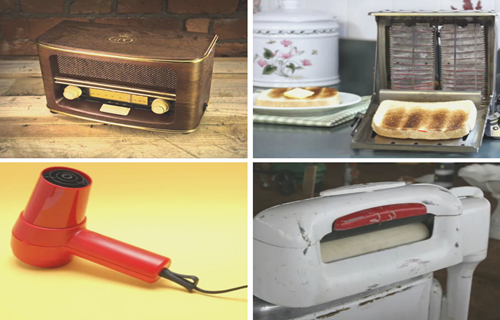The Risk of Asbestos Exposure from Vintage Products

Because asbestos is such a versatile material with numerous convenient properties, such as fire resistance, durability, and electricity resistance, it should come as no surprise that it was present in thousands of products during the last century. While asbestos was mostly used in industrial and military settings, it was also lurking in many consumer products, some of which are still available to purchase today as vintage items.
A very good example is the Bakelite telephones from the 1940s, which you can easily buy as memorabilia nowadays. It is worthy of note that Bakelite was the first company to manufacture plastic from phenol resin and formaldehyde in 1907. However, vintage Bakelite telephones contain up to 5% amosite asbestos, which can become very dangerous if it is disturbed. Regardless of the type, asbestos is always dangerous if the fibers become airborne, as they can subsequently be inhaled and ingested. Nevertheless, you should not be very alarmed in this regard, as exposure to asbestos from vintage products usually occurs in small amounts, if at all, which rarely leads to the development of a disease.
What Other Bakelite Products Contain Asbestos?
Since it was a renowned manufacturer of plastic, Bakelite was responsible for making numerous products with asbestos during the last century. While the majority of these products were harmless back in the day, when they were new, they may pose a risk of asbestos exposure today, as plastic becomes friable over the years and can thereby release toxic fibers in the air. The following products manufactured by Bakelite also contain asbestos, so you may want to think twice when intending to purchase a vintage item made by this company:
- cameras
- toys
- radios
- jewelry
- door handles
- hairdryers
If you have a Bakelite product in your home, it is of utmost importance to leave it undisturbed and, better yet, to get rid of it with the help of a company that specializes in safely disposing of asbestos products. Nonetheless, if the product is still in good condition, you can continue using it or, at least, keep it around as memorabilia. It is worthy of note that hairdryers are particularly dangerous when it comes to asbestos exposure, as their insides are insulated with asbestos to prevent overheating, and when in use, they can release toxic fibers in the air, which you will inevitably breathe in or swallow. Thereby, vintage hairdryers should be the exception and you should properly dispose of them if you have one.
What Consumer Products Would Contain Asbestos During the Last Century?
The heyday of asbestos was undoubtedly between 1920 and 1980 when millions of consumer products were manufactured with this carcinogenic mineral. Some of the household products that used to contain asbestos are the following:
- stoves
- ovens
- toasters
- slow cookers
- coffee pots
- bottle warmers
- popcorn poppers
- dishwashers
- washing machines
- dryers
- heaters
- ironing boards
- curling irons
- oven mitts
- dish towels
- potholders
- wicking for oil lamps
- placemats
- electric blankets
- ironing board covers
- fire blankets
When it comes to ironing boards, they would have a heat protective mat to stand the iron on, which was made from insulation containing up to 40% asbestos. With regular use, the ironing boards become chipped, cracked, and damaged, which can easily release asbestos fibers in the air. Two other common products that would contain asbestos during the last century were fake snow, which was made of chrysotile asbestos, and cigarette filters, namely the brand Kent, which, until 1956, would include asbestos in these products. If you have these old products in your home and are not in good condition, we advise you to remove them with the help of a company specializing in asbestos abatement, as they may pose a health threat if the asbestos inside of them becomes disturbed.
How to Deal with Old Asbestos Products in Your Home
The majority of circumstances in which frequent contact with asbestos occurs focus on the workplace - construction sites, chemical industries, shipyards, power plants, the metal industries. Thus, the most serious health risks come from long-term exposure to asbestos on the job. If you work with or around significant amounts of asbestos as part of your job, we can put you in touch with the right attorneys that may be able to get you the compensation you deserve for your pain and suffering.
If you have old asbestos products in your house, it would be ideal to have these items removed by a professional, certified company that specializes in asbestos abatement, as randomly disposing of products that contain asbestos is forbidden in the majority of states. By virtue of their knowledge, training, and resources, a team of professionals will know how to deal with old asbestos products such as hairdryers and ovens, so you should not hesitate to call one if you need to get rid of one or multiple asbestos products from your home.
